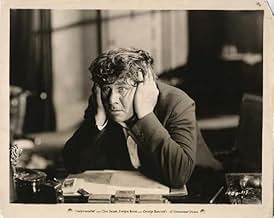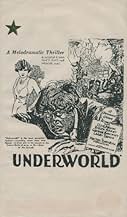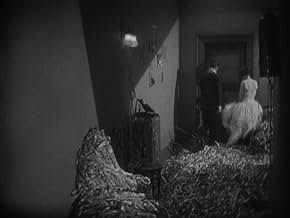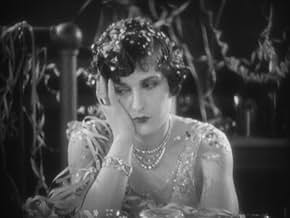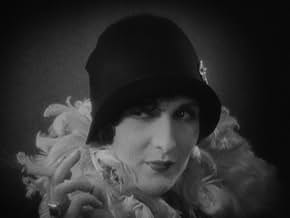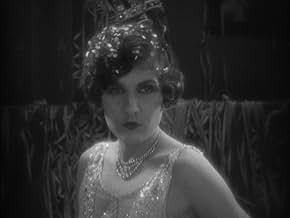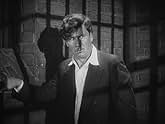IMDb-BEWERTUNG
7,5/10
3727
IHRE BEWERTUNG
Füge eine Handlung in deiner Sprache hinzuBoisterous gangster kingpin Bull Weed rehabilitates his former lawyer from his alcoholic haze, but complications arise when he falls for Weed's girlfriend.Boisterous gangster kingpin Bull Weed rehabilitates his former lawyer from his alcoholic haze, but complications arise when he falls for Weed's girlfriend.Boisterous gangster kingpin Bull Weed rehabilitates his former lawyer from his alcoholic haze, but complications arise when he falls for Weed's girlfriend.
- 1 Oscar gewonnen
- 5 wins total
Alfred Allen
- Judge
- (Nicht genannt)
Shep Houghton
- Street Kid
- (Nicht genannt)
Andy MacLennan
- One of Laughing Faces at the Ball
- (Nicht genannt)
Ida May
- Laughing Woman at the Ball
- (Nicht genannt)
Karl Morse
- 'High Collar' Sam
- (Nicht genannt)
Bob Reeves
- Detective at Railroad Station
- (Nicht genannt)
Julian Rivero
- One of Buck's Henchmen
- (Nicht genannt)
Empfohlene Bewertungen
I am not a big fan of the gangster film; when I am in the vicinity of the crime drama I always gravitate towards noir, where the moral lesson reserved for our protagonist in crime is not simply a present awareness that this life was only paid back with suffering but a deeper glimpse of the entire karmic process that produces a life of suffering.
In a gangster film this lesson is expressed in one of two ways; the protagonist is either left a broken, doomed being whose tragic fate is envied by no one, or is purged in the fire and brimstone of a final violence. So although we have watched secretly fascinated at the social fabric in ruins, it is important, in both respects, that we leave the theater restored in ethical order. We thus assume the role of the despised public enemy; his fate is ours for having indulged the antisocial fantasy. The final taste is always gingerly bitter, and works when it does because we invested so much of ourselves in the wrong side of the fence.
So you may hear of this as a milestone in the evolution of this type of film, and it's all because of the finale. It is this cathartic vision of some urban mid-station on the road to limbo where, amid a pall of gunsmoke and broken shards of brick wall, our protagonist comes to realize folly and is purged from life almost as a hero.
It is important to note that he doesn't go out all guns blazing, but rather surrenders to the cops. He will face death, but will not be even momentarily martyred on screen; what is heroic about him, so properly old fashioned, is that he honorably extricates from his bloody fate the innocent.
You can't miss any of this if you're a fan of the gangster genre. Scarface - the original - was built on this.
There are a few other instances that exert some cinematic intrigue; the fast-cutting of faces, superimpositions, shadows across walls. But it does not match the more interesting experiments going on in silent cinema of the time, or what this man would be doing the following year.
What is so apt about all of this is the smoky, drowsily anxious mood, the sense of excited weariness at the prospect of danger. There is a brawl in what only 30 years before would have been called a saloon. It's called the 'Dreamland Cafe', and just outside a neon sign reading 'The City is Yours' flashes the grinning mobster and his moll.
In a gangster film this lesson is expressed in one of two ways; the protagonist is either left a broken, doomed being whose tragic fate is envied by no one, or is purged in the fire and brimstone of a final violence. So although we have watched secretly fascinated at the social fabric in ruins, it is important, in both respects, that we leave the theater restored in ethical order. We thus assume the role of the despised public enemy; his fate is ours for having indulged the antisocial fantasy. The final taste is always gingerly bitter, and works when it does because we invested so much of ourselves in the wrong side of the fence.
So you may hear of this as a milestone in the evolution of this type of film, and it's all because of the finale. It is this cathartic vision of some urban mid-station on the road to limbo where, amid a pall of gunsmoke and broken shards of brick wall, our protagonist comes to realize folly and is purged from life almost as a hero.
It is important to note that he doesn't go out all guns blazing, but rather surrenders to the cops. He will face death, but will not be even momentarily martyred on screen; what is heroic about him, so properly old fashioned, is that he honorably extricates from his bloody fate the innocent.
You can't miss any of this if you're a fan of the gangster genre. Scarface - the original - was built on this.
There are a few other instances that exert some cinematic intrigue; the fast-cutting of faces, superimpositions, shadows across walls. But it does not match the more interesting experiments going on in silent cinema of the time, or what this man would be doing the following year.
What is so apt about all of this is the smoky, drowsily anxious mood, the sense of excited weariness at the prospect of danger. There is a brawl in what only 30 years before would have been called a saloon. It's called the 'Dreamland Cafe', and just outside a neon sign reading 'The City is Yours' flashes the grinning mobster and his moll.
With director Josef von Sternberg, and screenwriter Ben Hecht. George Bancroft stars as Bull Weed, a big, intimidating gang boss. After former-lawyer-turned-drunken-bum Rolls-Royce (Clive Brook) witnesses Bull pulling off a bank heist, the gangster brings the drunk back to his hideout, where he takes a shine to him. Bull gives Rolls a job, cleaning him up and having him act as a butler for Bull's moll, Feathers (Evelyn Brent). But the inevitable attraction starts to form between Rolls and Feathers, and Bull is bound to find out eventually. Also featuring Fred Kohler, Helen Lynch, Larry Semon, Jerry Mandy, and Alfred Allen.
While the film looks nice and moves along at a quick pace, it lacks the stylish touches one came to expect with later von Sternberg movies. Bancroft, the first real gangster-movie star, is good as the big 'n blustery Bull, while Brook brings the right amount of dissipated class, and Brent is pretty and multi-dimensional as the kept woman. These gangsters are more a "smash-and-grab" robbery outfit than the usual bootleggers. The movie also ends on what seems a false, anticlimactic note. Howard Hawks did some uncredited work on the script, which may account for the similarities to his and Hecht's later Scarface. Credited writer Hecht, meanwhile, who wanted to disown the picture before its release, went on to win the very first Best Screenplay Oscar for Underworld. This is one of the 101 Gangster Movies to See Before You Die.
While the film looks nice and moves along at a quick pace, it lacks the stylish touches one came to expect with later von Sternberg movies. Bancroft, the first real gangster-movie star, is good as the big 'n blustery Bull, while Brook brings the right amount of dissipated class, and Brent is pretty and multi-dimensional as the kept woman. These gangsters are more a "smash-and-grab" robbery outfit than the usual bootleggers. The movie also ends on what seems a false, anticlimactic note. Howard Hawks did some uncredited work on the script, which may account for the similarities to his and Hecht's later Scarface. Credited writer Hecht, meanwhile, who wanted to disown the picture before its release, went on to win the very first Best Screenplay Oscar for Underworld. This is one of the 101 Gangster Movies to See Before You Die.
Books and essays about the gangster genre often cite Josef Von Sternberg's Underworld as an early, influential milestone, but unfortunately it's not easy to track down in any home-viewable format. Recently I was lucky enough to see this film in a theater, accompanied by live music in a packed house of enthused buffs. Whenever possible, this is the way to see a silent movie! The combination of a good score and the response of a simpatico crowd can really bring these works to life. And while there are some dramas of the '20s that show their age and provoke giggles at the wrong moments, this one is not in that category. Underworld holds up, and offers an unlikely yet oddly credible romantic triangle set in a milieu of violent crime. Like all of Von Sternberg's work it's exquisitely well photographed, and like many late silent films takes full advantage of a range of dynamic devices, including a "whip-pan" from face to face in one early scene and a startlingly fast montage of close-ups in another. But what makes this movie click isn't flashy cinematography or editing, it's the chemistry between a trio of top-drawer players working at full steam.
The story is built around three personalities: Bull Weed, played by George Bancroft, "Feathers," played by Evelyn Brent, and "Rolls Royce," played by Clive Brook. Bancroft is unforgettable as Bull, an outlaw of the old school who robs banks and jewelry stores single-handed. The character is, in some respects, the model for gangland kingpins played in later years by Jimmy Cagney and Paul Muni, and yet in a sense he's not a "gangster" at all, for he works solo and has only a handful of allies who show up at key moments and then vanish. Bull doesn't travel with bodyguards or hang out with the boys; despite his natty suits and urban lifestyle he suggests a Western bad man who rides alone. In the early scenes when he's at the top of his game Bull is boisterous, punctuating every conversation with gusts of hearty laughter, but as his situation darkens the laughter vanishes and the guy suddenly resembles an actual bull in an arena, grim and beady-eyed, still physically powerful but cornered and bewildered over how it could have happened. It's easy to see why this performance made George Bancroft so popular at the time: he's a larger-than-life actor with one of those homely/attractive faces, along the lines of an Edward G. Robinson or a Wallace Beery, not handsome but decidedly charismatic.
The beautiful Evelyn Brent is Bull's girlfriend Feathers, so called because of her feathery outfits. Although her character is not as fully delineated as Bancroft's Brent manages to convey a great deal of information with her fascinating eyes. It's clear that Feathers is a lot more intelligent than she lets on. She stays with Bull out of loyalty and gratitude but is well aware of his limitations, and increasingly unhappy about her own dependent status as his "moll." When an opportunity arises to run away with a more attractive and substantial guy she is immediately tempted, even if it means toying with the idea of betraying Bull to the cops, but she's also decent enough to recognize her obligation to him. Bull, after all, risks everything as a direct result of defending her honor when she's attacked. Feathers, despite her froufrou outfits and a nickname more suitable to a bimbo, is smart, sensitive, and surprisingly ethical for someone in her position.
Bancroft and Brent are terrific, but for my money the most memorable performance in Underworld is delivered by Clive Brook. Before this I'd seen Brook in several other films (including Von Sternberg's Shanghai Express opposite Marlene Dietrich), most often playing noble, stiff-upper-lip Englishmen, handsome and respectable but just a bit dull. Here, Brook is a revelation. In the opening scenes he's so decrepit he's not even recognizable, playing against type as a washed-up bum, unshaven and bleary-eyed. We learn that Brook's character is an attorney who went crooked and eventually became an alcoholic, but we aren't told much more. However, like Brent, the actor tells us everything we need to know that isn't directly stated in the text. His transformation begins when Bull Weed takes a liking to him, nicknames him "Rolls Royce" and makes him, in effect, his lieutenant. Much of what happens after that point concerns the growing tension between the three characters as an unavoidable attraction develops between Feathers and Rolls Royce, although they fight temptation and struggle to remain loyal to their boss. The scenes between the trio really heat up as the sexual tension between Feathers and Rolls Royce deepens.
Underworld isn't as flamboyantly violent as some of the famous crime flicks of the '30s and '40s, but there are a number of stylistic touches that mark it as a definite progenitor of those films. For instance, just before the climactic gun battle, Bull takes a sympathetic interest in an orphaned kitten, a motif echoed years later in This Gun for Hire. At another point, with rather heavy irony, a crook is gunned down in a flower shop before a wreath reading "Rest In Peace." A drawback as the film rolls along is the pile-up of increasingly unlikely plot twists, especially where Bull's escape from jail is concerned, although the momentum of events tends to carry the viewer along. Also, while the writing is generally taut, one title card during the gangsters' party sequence is so over-written it suggests a witches' coven. (This line drew chuckles at the screening I attended.) Aside from that unfortunate lapse into purple prose, Underworld holds up beautifully, at least as well as the more familiar gangster classics of the '30s it influenced. This film deserves the attention that should come with a full restoration and greater availability.
The story is built around three personalities: Bull Weed, played by George Bancroft, "Feathers," played by Evelyn Brent, and "Rolls Royce," played by Clive Brook. Bancroft is unforgettable as Bull, an outlaw of the old school who robs banks and jewelry stores single-handed. The character is, in some respects, the model for gangland kingpins played in later years by Jimmy Cagney and Paul Muni, and yet in a sense he's not a "gangster" at all, for he works solo and has only a handful of allies who show up at key moments and then vanish. Bull doesn't travel with bodyguards or hang out with the boys; despite his natty suits and urban lifestyle he suggests a Western bad man who rides alone. In the early scenes when he's at the top of his game Bull is boisterous, punctuating every conversation with gusts of hearty laughter, but as his situation darkens the laughter vanishes and the guy suddenly resembles an actual bull in an arena, grim and beady-eyed, still physically powerful but cornered and bewildered over how it could have happened. It's easy to see why this performance made George Bancroft so popular at the time: he's a larger-than-life actor with one of those homely/attractive faces, along the lines of an Edward G. Robinson or a Wallace Beery, not handsome but decidedly charismatic.
The beautiful Evelyn Brent is Bull's girlfriend Feathers, so called because of her feathery outfits. Although her character is not as fully delineated as Bancroft's Brent manages to convey a great deal of information with her fascinating eyes. It's clear that Feathers is a lot more intelligent than she lets on. She stays with Bull out of loyalty and gratitude but is well aware of his limitations, and increasingly unhappy about her own dependent status as his "moll." When an opportunity arises to run away with a more attractive and substantial guy she is immediately tempted, even if it means toying with the idea of betraying Bull to the cops, but she's also decent enough to recognize her obligation to him. Bull, after all, risks everything as a direct result of defending her honor when she's attacked. Feathers, despite her froufrou outfits and a nickname more suitable to a bimbo, is smart, sensitive, and surprisingly ethical for someone in her position.
Bancroft and Brent are terrific, but for my money the most memorable performance in Underworld is delivered by Clive Brook. Before this I'd seen Brook in several other films (including Von Sternberg's Shanghai Express opposite Marlene Dietrich), most often playing noble, stiff-upper-lip Englishmen, handsome and respectable but just a bit dull. Here, Brook is a revelation. In the opening scenes he's so decrepit he's not even recognizable, playing against type as a washed-up bum, unshaven and bleary-eyed. We learn that Brook's character is an attorney who went crooked and eventually became an alcoholic, but we aren't told much more. However, like Brent, the actor tells us everything we need to know that isn't directly stated in the text. His transformation begins when Bull Weed takes a liking to him, nicknames him "Rolls Royce" and makes him, in effect, his lieutenant. Much of what happens after that point concerns the growing tension between the three characters as an unavoidable attraction develops between Feathers and Rolls Royce, although they fight temptation and struggle to remain loyal to their boss. The scenes between the trio really heat up as the sexual tension between Feathers and Rolls Royce deepens.
Underworld isn't as flamboyantly violent as some of the famous crime flicks of the '30s and '40s, but there are a number of stylistic touches that mark it as a definite progenitor of those films. For instance, just before the climactic gun battle, Bull takes a sympathetic interest in an orphaned kitten, a motif echoed years later in This Gun for Hire. At another point, with rather heavy irony, a crook is gunned down in a flower shop before a wreath reading "Rest In Peace." A drawback as the film rolls along is the pile-up of increasingly unlikely plot twists, especially where Bull's escape from jail is concerned, although the momentum of events tends to carry the viewer along. Also, while the writing is generally taut, one title card during the gangsters' party sequence is so over-written it suggests a witches' coven. (This line drew chuckles at the screening I attended.) Aside from that unfortunate lapse into purple prose, Underworld holds up beautifully, at least as well as the more familiar gangster classics of the '30s it influenced. This film deserves the attention that should come with a full restoration and greater availability.
The stars are beautifully photographed; the lighting sets the mood, and Ben Hecht's Academy Award winning screenplay all combine to make this the definitive "gangster picture", done before many of the elements became cliches.
One of the great joys of prohibition-era gangster films is the colorful dialogue spat out by the likes of James Cagney and Edward G. Robinson. As that element would, obviously, be missing from a silent film, I wasn't sure how I would react to Underworld.
Not to worry. This is a great film, one of the best prohibition-era gangster films I've seen, ranking slightly ahead of Little Caesar and the Public Enemy, and maybe only slightly below Scarface (1932). Tough, tense, tightly written--interestingly, Howard Hawks is credited for the scenario--and with gorgeous DARK cinematography and Josef von Sternberg's usual excellence in direction. I barely missed the lack of gangster-speak.
I suppose this film was a template upon which a lot of gangster films were based. It struck me while watching it how much it had in common with the Coen brothers' Miller's Crossing (1990)--a love triangle between a mob boss, his moll, and his right hand man. And it's all about the gangsters' peculiar code of ethics.
I'd rate it a perfect 10, but for a muddled and badly-handled prison break sequence, which I watched three times and still couldn't figure out. Maybe I'm just dense; maybe it was actually a genius bit of filmmaking and it just flew over my head, but for now, 9/10.
Not to worry. This is a great film, one of the best prohibition-era gangster films I've seen, ranking slightly ahead of Little Caesar and the Public Enemy, and maybe only slightly below Scarface (1932). Tough, tense, tightly written--interestingly, Howard Hawks is credited for the scenario--and with gorgeous DARK cinematography and Josef von Sternberg's usual excellence in direction. I barely missed the lack of gangster-speak.
I suppose this film was a template upon which a lot of gangster films were based. It struck me while watching it how much it had in common with the Coen brothers' Miller's Crossing (1990)--a love triangle between a mob boss, his moll, and his right hand man. And it's all about the gangsters' peculiar code of ethics.
I'd rate it a perfect 10, but for a muddled and badly-handled prison break sequence, which I watched three times and still couldn't figure out. Maybe I'm just dense; maybe it was actually a genius bit of filmmaking and it just flew over my head, but for now, 9/10.
Wusstest du schon
- WissenswertesThe film was predicted to be a flop, was shelved by Paramount and eventually released in only one theater in New York. Screenwriter Ben Hecht demanded that his name was taken off the credits. As a result of strong word-of-mouth the movie became an enormous hit and won Hecht the first of his two Academy Awards.
- Zitate
'Bull' Weed: -There was something I had to find out - - and that hour was worth more to me than my whole life.
- VerbindungenFeatured in The House That Shadows Built (1931)
Top-Auswahl
Melde dich zum Bewerten an und greife auf die Watchlist für personalisierte Empfehlungen zu.
- How long is Underworld?Powered by Alexa
Details
Box Office
- Bruttoertrag in den USA und Kanada
- 1.642.194 $
- Laufzeit1 Stunde 20 Minuten
- Sound-Mix
- Seitenverhältnis
- 1.33 : 1
Zu dieser Seite beitragen
Bearbeitung vorschlagen oder fehlenden Inhalt hinzufügen


